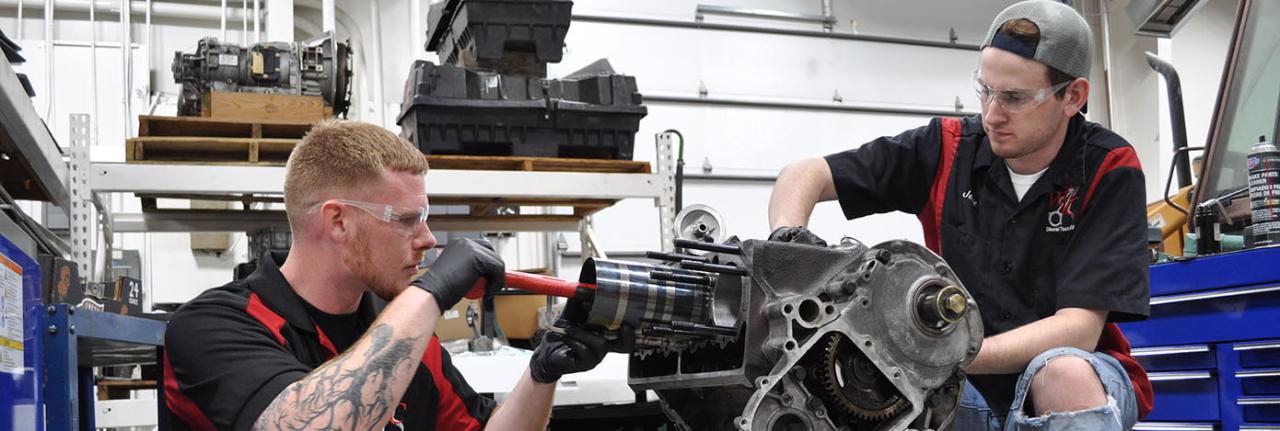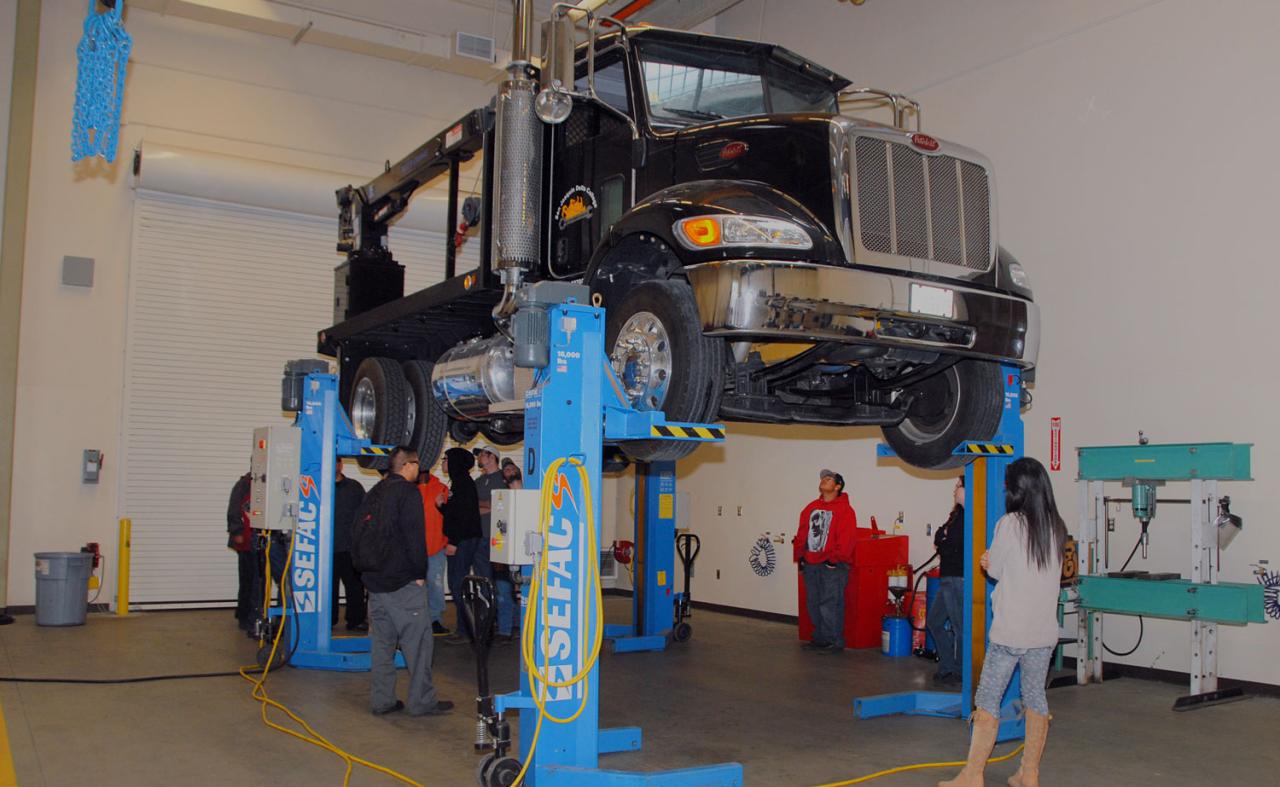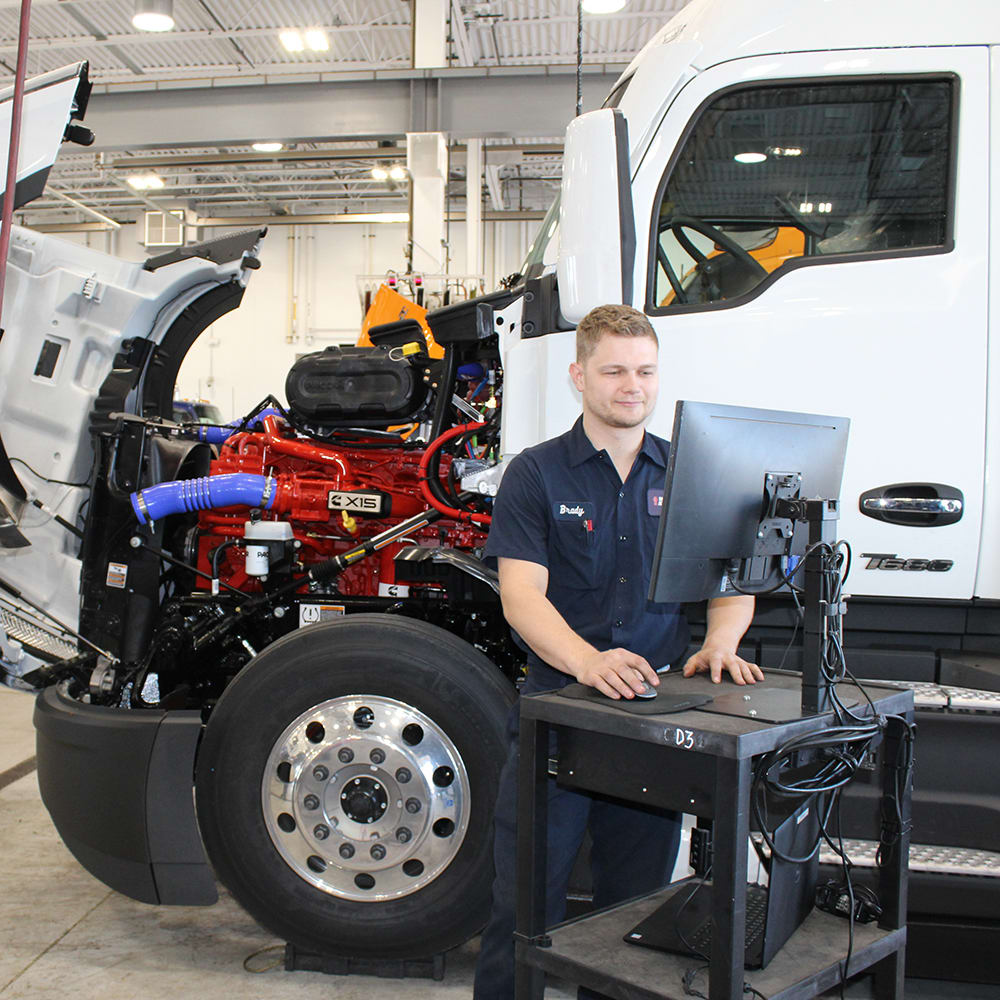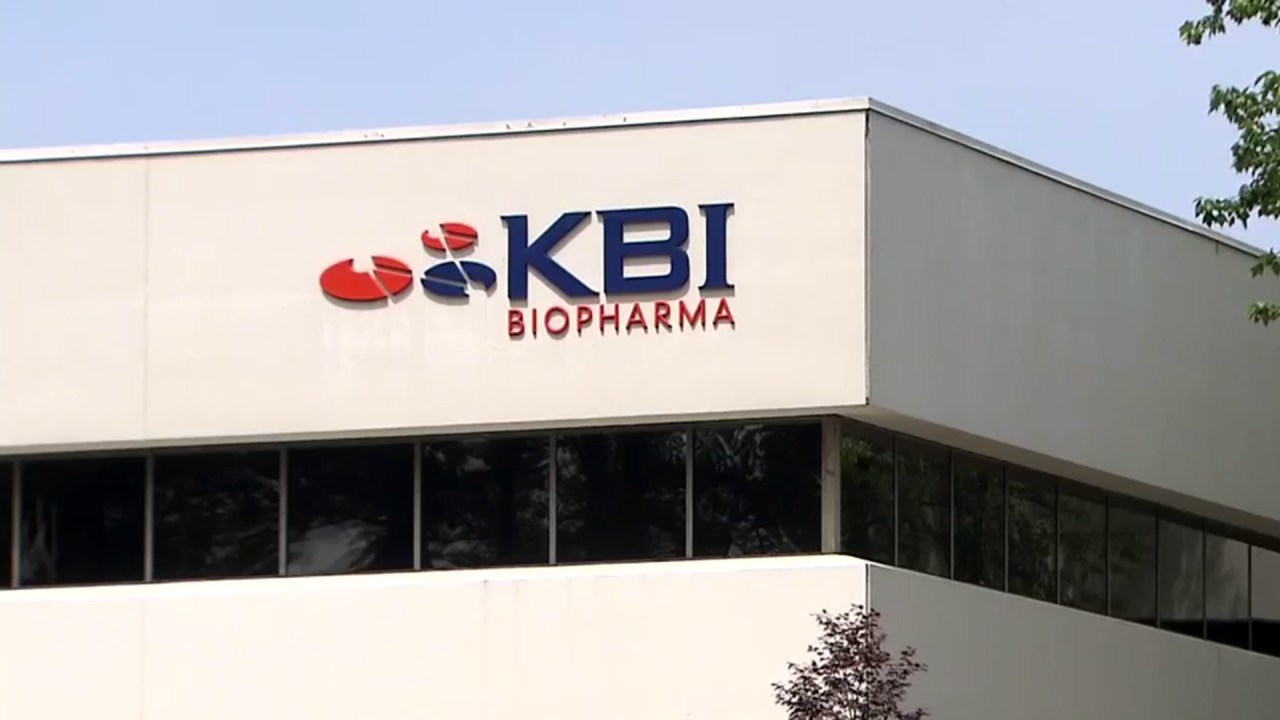Diesel Technology Jobs: Powering Industries
Diesel technology jobs are the backbone of numerous industries, from transportation and construction to agriculture and manufacturing. These roles are essential for keeping our world moving, and they offer a […]

Diesel technology jobs are the backbone of numerous industries, from transportation and construction to agriculture and manufacturing. These roles are essential for keeping our world moving, and they offer a diverse range of opportunities for skilled professionals.
The diesel technology industry has a rich history, evolving alongside the development of internal combustion engines. Today, diesel engines are known for their efficiency and power, making them crucial components in many applications. From heavy-duty trucks and construction equipment to farm machinery and marine vessels, diesel technology plays a vital role in modern society.
The Diesel Technology Industry
The diesel engine, a marvel of engineering, has revolutionized transportation, construction, and countless other industries since its invention in the late 19th century. From its humble beginnings to its current state-of-the-art advancements, diesel technology has played a pivotal role in shaping our modern world.
Historical Evolution and Impact
Rudolf Diesel, a German engineer, patented the first diesel engine in 1892. This invention marked a significant milestone in the history of internal combustion engines, offering greater efficiency and power compared to gasoline engines. Early diesel engines were primarily used in stationary applications, powering factories and ships. However, their robust nature and fuel efficiency soon led to their adoption in other sectors, such as transportation and construction.
The 20th century witnessed the widespread adoption of diesel engines in various industries. Their use in heavy-duty trucks, buses, and locomotives transformed long-haul transportation, enabling efficient movement of goods and people across vast distances. In construction, diesel engines powered bulldozers, excavators, and cranes, revolutionizing infrastructure development. The agricultural sector also embraced diesel technology, with tractors and other farm machinery powered by these reliable engines.
Current State and Innovations
The diesel technology industry continues to evolve, driven by technological advancements and environmental concerns. Today, diesel engines are more fuel-efficient, cleaner, and quieter than ever before. Innovations like selective catalytic reduction (SCR) and diesel particulate filters (DPF) have significantly reduced emissions, making diesel engines more environmentally friendly.
The industry is also focusing on alternative fuels, such as biodiesel and renewable diesel, to further reduce emissions and improve sustainability. These bio-based fuels offer a promising path towards a greener future for diesel technology.
Sectors Relying on Diesel Technology
Diesel technology remains crucial across various sectors, powering numerous applications and contributing to economic growth.
Transportation
- Heavy-Duty Trucks: Diesel engines are the dominant power source for long-haul trucking, enabling efficient freight transportation across continents. Their high torque and fuel efficiency make them ideal for hauling heavy loads over long distances.
- Buses: Diesel engines power a significant portion of the world’s bus fleet, providing reliable and efficient transportation for commuters and tourists.
- Railways: Diesel locomotives play a vital role in freight and passenger transportation, especially in areas where electrification is not feasible.
- Marine: Diesel engines are the primary power source for ships and boats of all sizes, from small fishing vessels to large cargo ships. Their reliability and fuel efficiency make them suitable for long voyages and demanding marine applications.
Construction
- Heavy Equipment: Diesel engines power bulldozers, excavators, cranes, and other heavy construction equipment, enabling efficient earthmoving, lifting, and construction tasks.
- Generators: Diesel generators provide reliable power backup for construction sites, ensuring uninterrupted operations even during power outages.
Agriculture
- Tractors: Diesel tractors are the backbone of modern agriculture, powering plowing, planting, harvesting, and other essential farm operations.
- Farm Machinery: Diesel engines power a wide range of agricultural machinery, including combines, balers, and sprayers, enhancing productivity and efficiency in farming.
Types of Diesel Technology Jobs

The diesel technology field offers a diverse range of career opportunities, catering to various skill sets and interests. From engineering and design to maintenance and repair, there are numerous paths to explore within this dynamic industry. This section delves into the specific roles and responsibilities associated with different diesel technology jobs, highlighting the unique skill sets required and potential career growth opportunities.
Diesel Engineers
Diesel engineers play a crucial role in the design, development, and testing of diesel engines and related systems. Their responsibilities encompass:
- Designing and analyzing engine components, including combustion chambers, fuel systems, and exhaust systems.
- Developing new engine technologies to enhance efficiency, reduce emissions, and improve performance.
- Conducting simulations and testing to evaluate engine performance and optimize designs.
- Collaborating with other engineers and technicians to ensure seamless integration of diesel engines into various applications.
A strong foundation in mechanical engineering principles, thermodynamics, and fluid dynamics is essential for diesel engineers. Additionally, proficiency in computer-aided design (CAD) software and analytical tools is highly valued.
Diesel Technicians
Diesel technicians are responsible for the maintenance, repair, and troubleshooting of diesel engines and related equipment. They perform a wide range of tasks, including:
- Diagnosing engine problems using diagnostic tools and their technical expertise.
- Performing routine maintenance tasks, such as oil changes, filter replacements, and inspections.
- Repairing and replacing engine components, including fuel injectors, turbochargers, and transmissions.
- Troubleshooting electrical systems, hydraulic systems, and other engine-related components.
Diesel technicians require a strong understanding of diesel engine operation, mechanical principles, and electrical systems. They also need to be proficient in using specialized tools and equipment.
Diesel Mechanics
Diesel mechanics specialize in the repair and maintenance of heavy-duty diesel engines used in trucks, buses, construction equipment, and other large vehicles. Their responsibilities include:
- Inspecting and diagnosing engine problems, identifying faulty components and recommending repair solutions.
- Performing routine maintenance tasks, such as oil changes, filter replacements, and brake inspections.
- Overhauling engines, replacing worn or damaged components, and ensuring proper engine assembly.
- Troubleshooting electrical and hydraulic systems, and resolving issues related to engine performance.
Diesel mechanics require a strong understanding of diesel engine operation, mechanical principles, and troubleshooting techniques. They also need to be familiar with safety procedures and regulations related to heavy-duty vehicles.
Diesel Service Professionals
Diesel service professionals provide specialized services related to diesel engines, including:
- Performing engine tune-ups, adjusting engine settings, and optimizing performance.
- Installing and maintaining engine accessories, such as exhaust systems, air filters, and cooling systems.
- Providing on-site repair services for diesel engines in various locations.
- Consulting with customers on engine maintenance and repair needs.
Diesel service professionals require a strong understanding of diesel engine operation, maintenance procedures, and customer service skills. They also need to be able to work independently and handle challenging situations effectively.
Career Paths in Diesel Technology
The diesel technology field offers a variety of career paths, with opportunities for advancement and specialization.
- Entry-level positions often involve working as a diesel technician or mechanic, gaining hands-on experience and developing essential skills.
- Experienced technicians can advance to supervisory roles, managing teams of technicians and overseeing maintenance operations.
- Specialization in areas such as engine diagnostics, emissions control, or heavy-duty truck repair can lead to higher-paying positions and increased career opportunities.
- Higher education, such as a bachelor’s degree in diesel technology or mechanical engineering, can open doors to engineering roles, research positions, or management positions.
The salary range for diesel technology jobs varies depending on experience, location, and specialization. Entry-level positions typically start at around $40,000 per year, while experienced technicians and engineers can earn upwards of $80,000 per year.
Skills and Qualifications for Diesel Technology Jobs

A career in diesel technology requires a unique blend of technical expertise and soft skills. Individuals in this field must possess a deep understanding of diesel engines and their intricate systems, along with the ability to work effectively in a demanding and often physically challenging environment.
Essential Technical Skills, Diesel technology jobs
These skills are the foundation of a diesel technician’s expertise. They enable individuals to diagnose problems, perform repairs, and maintain diesel engines to ensure optimal performance and safety.
- Engine Diagnostics: Diesel technicians must be proficient in using diagnostic tools and software to identify engine malfunctions. This involves interpreting fault codes, analyzing sensor data, and understanding the complex interplay of various engine systems.
- Engine Repair: Repairing diesel engines requires a thorough understanding of engine components, their functions, and common failure modes. Technicians must be skilled in disassembling, inspecting, repairing, and reassembling engines, ensuring that all components are properly installed and functioning correctly.
- Engine Maintenance: Regular maintenance is crucial for preventing breakdowns and extending the lifespan of diesel engines. Diesel technicians perform routine maintenance tasks such as oil changes, filter replacements, and inspections of critical components. They must also be familiar with manufacturer-recommended maintenance schedules and procedures.
- Fuel Systems: Understanding fuel systems is critical for diesel technicians. They must be proficient in troubleshooting fuel injection systems, fuel lines, filters, and fuel tanks. This includes diagnosing and repairing fuel leaks, addressing fuel pressure issues, and ensuring proper fuel delivery to the engine.
- Electrical Systems: Diesel engines rely on sophisticated electrical systems for ignition, control, and monitoring. Technicians must have a strong grasp of electrical principles, wiring diagrams, and troubleshooting techniques to diagnose and repair electrical issues.
- Hydraulic Systems: Many diesel-powered equipment utilize hydraulic systems for operation. Diesel technicians must understand hydraulic principles, components, and troubleshooting methods to diagnose and repair hydraulic leaks, pressure issues, and other malfunctions.
- Safety Procedures: Working with diesel engines involves inherent safety risks. Technicians must be rigorously trained in safety procedures, including proper handling of tools, wearing personal protective equipment, and following safety protocols when working with potentially hazardous materials and equipment.
Soft Skills
While technical skills are essential, soft skills are equally important for success in diesel technology. These skills enable technicians to communicate effectively, work collaboratively, and solve problems efficiently.
- Communication: Diesel technicians must be able to communicate clearly and concisely with customers, colleagues, and supervisors. This includes explaining technical issues in a way that is easily understood, providing accurate estimates, and documenting work performed.
- Teamwork: Many diesel technology jobs involve working as part of a team, collaborating with other technicians, mechanics, and engineers. Effective teamwork requires the ability to share information, coordinate tasks, and work towards common goals.
- Problem-Solving: Diesel technicians often face complex and challenging problems. They must be able to analyze situations, identify root causes, and develop effective solutions. This involves critical thinking, analytical skills, and the ability to adapt to unexpected situations.
- Time Management: Diesel technicians often work under tight deadlines and need to manage their time effectively. This involves prioritizing tasks, planning work efficiently, and meeting deadlines consistently.
Educational and Training Pathways
Individuals seeking to enter the diesel technology workforce have several educational and training options available to them.
- High School Diploma or Equivalent: A high school diploma or GED is typically the minimum educational requirement for entry-level diesel technology jobs. This provides a foundation in basic math, science, and language arts, which are essential for understanding technical concepts and communicating effectively.
- Trade Schools and Vocational Programs: Trade schools and vocational programs offer specialized training in diesel technology, providing hands-on experience and practical skills. These programs typically cover topics such as engine diagnostics, repair, maintenance, and safety procedures. Some programs may also offer industry certifications, which can enhance employment prospects.
- Community Colleges and Technical Institutes: Community colleges and technical institutes offer associate degrees and certificates in diesel technology. These programs provide a more comprehensive education, covering a wider range of topics, including engine theory, electrical systems, hydraulics, and computer-aided design. Graduates of these programs may be qualified for a wider range of positions, including supervisory and management roles.
- Apprenticeships: Apprenticeships combine on-the-job training with classroom instruction. This allows individuals to gain practical experience while learning from experienced diesel technicians. Apprenticeships are often offered by dealerships, repair shops, and manufacturers, providing valuable industry experience and networking opportunities.
- Continuing Education: The diesel technology field is constantly evolving, with new technologies and regulations emerging regularly. Continuing education is essential for staying up-to-date and maintaining professional competence. Technicians can participate in workshops, seminars, and online courses to enhance their skills and knowledge.
The Future of Diesel Technology Jobs
The diesel technology industry is facing a period of significant transformation, driven by advancements in technology and evolving environmental regulations. While diesel engines remain essential in many sectors, the emergence of alternative technologies like electric vehicles and renewable fuels presents both challenges and opportunities for diesel technicians.
The Impact of Emerging Technologies
The rise of electric vehicles (EVs) and alternative fuels is undeniably impacting the diesel technology industry. While EVs are gaining popularity in passenger vehicles, their adoption in heavy-duty trucking and other commercial applications is slower due to factors like range limitations, infrastructure constraints, and high costs. However, advancements in battery technology and charging infrastructure are gradually addressing these concerns, paving the way for greater EV penetration in the commercial sector.
- Impact on Diesel Technician Demand: The shift towards EVs could potentially reduce the demand for traditional diesel technicians, particularly in passenger vehicle maintenance. However, the transition is expected to be gradual, and diesel engines will likely remain prevalent in heavy-duty applications for several years to come.
- Emerging Opportunities: The increasing use of alternative fuels, such as biodiesel and renewable diesel, is creating new opportunities for diesel technicians specializing in these technologies. These technicians will need to be knowledgeable about the properties and handling of alternative fuels, as well as the modifications required to adapt diesel engines for their use.
The Role of Automation and Artificial Intelligence
Automation and artificial intelligence (AI) are playing an increasingly important role in the diesel technology industry. These technologies are being used to streamline maintenance processes, improve diagnostics, and enhance efficiency.
- Automated Maintenance: Automated systems can perform routine maintenance tasks, such as oil changes and filter replacements, freeing up technicians to focus on more complex repairs. This automation can also improve accuracy and consistency in maintenance procedures.
- AI-Powered Diagnostics: AI algorithms can analyze sensor data from diesel engines to identify potential problems and predict failures. This predictive maintenance approach can help prevent breakdowns and optimize engine performance.
Future Skills and Qualifications
To thrive in the evolving diesel technology landscape, technicians will need to adapt and acquire new skills. Here are some key areas of expertise that will be in demand:
- Hybrid and Electric Vehicle Technology: As the adoption of hybrid and electric vehicles increases, technicians will need to be familiar with their components, operation, and maintenance procedures.
- Alternative Fuel Systems: Knowledge of biodiesel, renewable diesel, and other alternative fuels, including their properties, handling, and compatibility with diesel engines, will be essential.
- Advanced Diagnostics and Data Analysis: Technicians will need to be proficient in using diagnostic tools and interpreting data from sensors and engine control units.
- Automation and AI: Familiarity with automated systems and AI-powered diagnostics will be increasingly valuable, allowing technicians to work more efficiently and effectively.
- Cybersecurity: As diesel engines become more interconnected, technicians will need to understand cybersecurity principles to protect vehicles from cyberattacks.
End of Discussion

As the diesel technology industry continues to evolve, the demand for skilled professionals will remain high. With the right education and training, individuals can pursue fulfilling careers in this dynamic field, contributing to the advancement of technology and the success of various industries.
Diesel technology jobs are often associated with loud machinery and environments, making hearing protection a crucial concern. Fortunately, advancements in hearing technology have led to the development of innovative solutions like those offered by advanced hearing technologies. These technologies not only protect hearing but also enhance communication in noisy workspaces, allowing diesel technicians to focus on their tasks while ensuring their hearing health.




